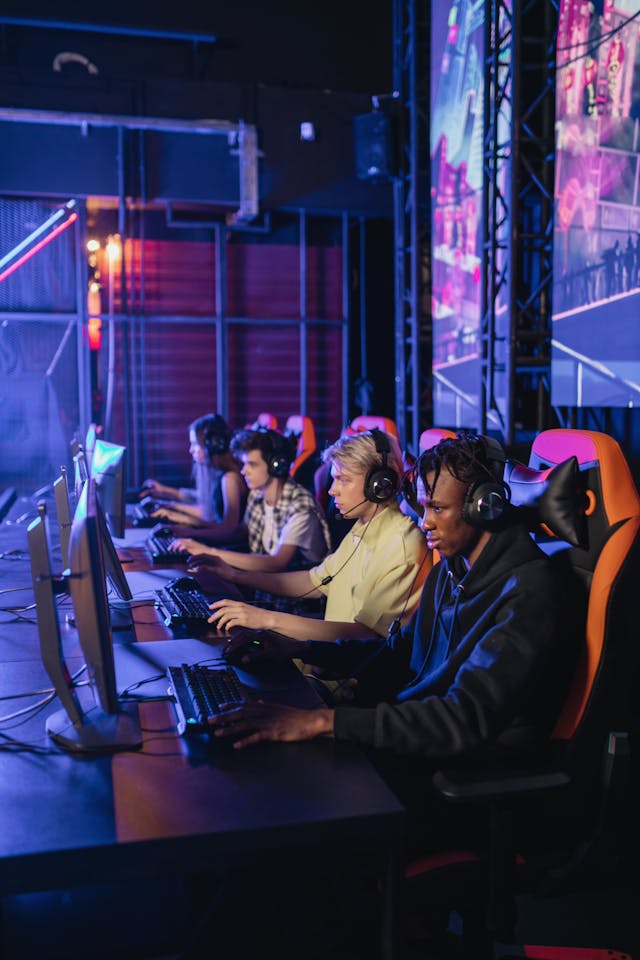E-Sports
E-sports (short for electronic sports) refers to competitive video gaming, where professional players compete individually or as teams in organized tournaments. It's a rapidly growing global phenomenon that combines the excitement of sports with the interactivity of video games, attracting millions of players and fans worldwide.
Core Aspects of E-sports
1. Game Genres in E-sports:
- > Multiplayer Online Battle Arena (MOBA): League of Legends, Dota 2.
- > First-Person Shooter (FPS): Counter-Strike: Global Offensive (CS:GO), Valorant.
- > Battle Royale: Fortnite, PUBG.
- > Sports Simulations: FIFA, NBA 2K.
- > Fighting Games: Tekken, Street Fighter, Super Smash Bros.
- > Real-Time Strategy (RTS): Starcraft II.
2. Key Stakeholders in E-sports
- > Players: Professional gamers specializing in specific games.
- > Teams:Organizations like Team Liquid, T1, and Cloud9 manage players, strategies, and branding.
- > Game Publishers:Companies like Riot Games, Blizzard, and Valve often organize tournaments for their games.
- > Tournaments and Leagues:
- - The International (Dota 2): Known for its massive prize pools.
- - League of Legends World Championship: A global e-sports spectacle.
- - Fortnite World Cup: Popular among younger audiences.
- > Streaming Platforms: Twitch, YouTube Gaming, and Facebook Gaming are key for broadcasting matches.
- > Sponsors: Brands like Red Bull, Intel, and Razer invest heavily in e-sports for visibility.
3. E-sports Ecosystem
- > Players and Teams:
- - Players train rigorously and often specialize in one game.
- - Teams provide coaching, housing, and financial support to players.
- > Tournaments and Events:
- - Online: Hosted on platforms like Battlefy and Challonge.
- - Offline (LAN): Held in arenas with live audiences.
- > Live Streaming and Content Creation:
- - Fans engage through platforms like Twitch or YouTube.
- - Influencers and streamers create additional content such as tutorials and highlights.
- > Revenue Streams:
- - Sponsorships and advertising.
- - Prize pools from tournaments.
- - Merchandise sales (jerseys, gaming gear, collectibles).
- - Ticket sales for live events.
The Rise of E-sports
1. Popularity Growth:
- > Global Audience:Over 500 million people watch e-sports events annually, with viewership rivaling traditional sports.
- > Cultural Impact:E-sports has influenced mainstream media, fashion, and even education, with universities offering scholarships for gaming.
2. Prize Pools:
- > Tournaments often feature enormous prize pools, e.g.:
- - The International 2023: Over $40 million in prizes.
- - Fortnite World Cup: $30 million prize pool.
3. Technological Advancements:
- 5G and High-Speed Internet:Enables seamless gameplay and global participation.
- Virtual Reality (VR) and Augmented Reality (AR):Set to revolutionize e-sports with immersive experiences.
Benefits of E-sports
- > For Players:
- - Opportunities for lucrative careers.
- - Development of strategic thinking, reflexes, and teamwork.
- > For Fans:
- - A sense of community and entertainment.
- - Accessibility to watch and participate.
- > For Brands and Sponsors:
- - Reach a young, tech-savvy audience.
- - High engagement rates.
Challenges in E-sports
- Player Burnout: Intense schedules can lead to mental and physical exhaustion.
- Cheating and Hacking: Threatens the integrity of competitions.
- Regulatory Issues: Lack of standardized governance in some regions.
- Sustainability:Ensuring smaller teams and tournaments remain viable.
E-sports Career Opportunities
1. Player/Pro Gamer:
- > Requires exceptional skill, quick reflexes, and deep game knowledge.
- > Involves training for hours daily.
2. Game Developer/Designer:
- > Focus on designing games optimized for competitive play.
3. E-sports Manager/Coach:
- > Develop strategies, manage teams, and optimize performance.
4. Content Creator/Streamer:
- > Share gameplay and engage fans through streaming platforms.
5. Event Organizer:
- > Plan and execute e-sports tournaments.
6. Marketing and Branding Specialist:
- > Promote teams, events, or gaming products.
Future of E-sports
- > Integration with Traditional Sports: Collaborations between leagues like the NBA and FIFA with e-sports.
- > Metaverse: Virtual worlds could redefine how tournaments are held and experienced.
- > Mainstream Acceptance: E-sports is increasingly recognized as a legitimate sport globally.


